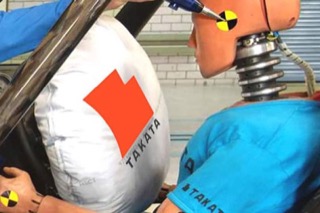Ford Recalls Exploding Takata Airbag Inflators

Ford is issuing a recall for 59,000 Takata airbag inflators. The automaker has named the affected vehicles as the 2005-2007 Mustang, 2005-2006 GT, and 2004 Ranger vehicles.
What – Inflators are controlled exposions that deploy the airbags in the event of a crash. Takata's inflators are failing under pressure and exploding with too much force, so when the airbag deploys, sharp metal shrapnel from the inflator also shoots out into the cabin. The inflators were first recalled in 3 million vehicles, none of them Fords, last year.
Where – The inflators are failing in places of higher humidity which is why this is a regional recall limited to vehicles originally sold or currently registered in Florida, Puerto Rico, Hawaii and the U.S. Virgin Islands.
When – Neither Ford or the National Highway Traffic Safety Administration (NHTSA) has released a date for the recall. You can call Ford at 800-392-3673 and reference recall number 14B04.
More information on carcomplaints.comWant to Learn More?
Which Ford Vehicles Have Dangerous Takata Airbags?
A large number of Subaru vehicles have been recalled because they contain dangerous airbag inflators made by Takata. The shrapnel-hurling inflators have been recalled in over 37 million vehicles (and counting).

Related Ford Generations
At least one model year in these 3 generations have a relationship to this story.
We track this because a generation is just a group of model years where very little changes from year-to-year. Chances are owners throughout these generation will want to know about this news. Click on a generation for more information.
1st Generation GT
- Years
- 2005–2006
- Reliability
- 7th out of 94
- PainRank™
- 0.5
- Complaints
- 4
5th Generation Mustang
- Years
- 2005–2014
- Reliability
- 75th out of 94
- PainRank™
- 24.65
- Complaints
- 980
2nd Generation Ranger
- Years
- 1993–2013
- Reliability
- 57th out of 94
- PainRank™
- 9.62
- Complaints
- 716